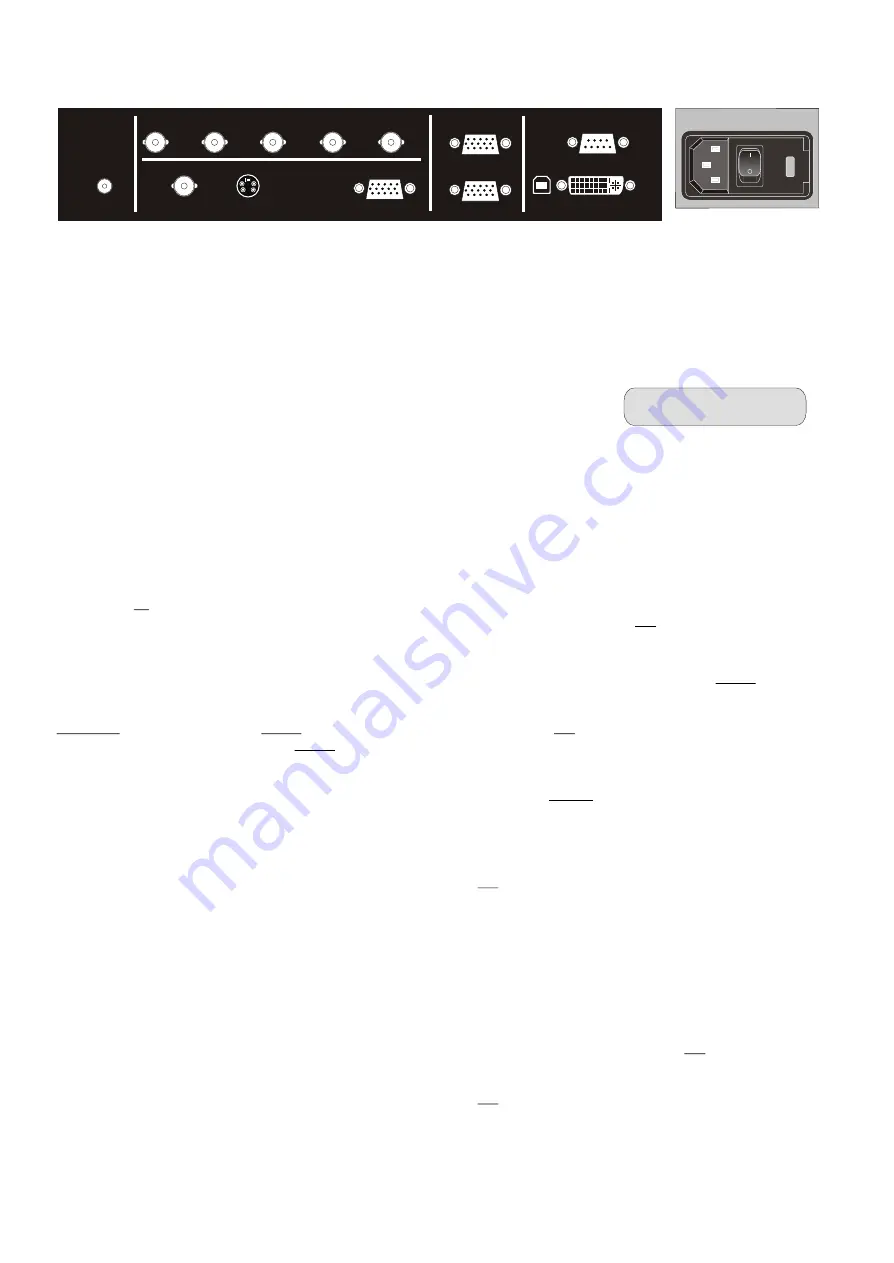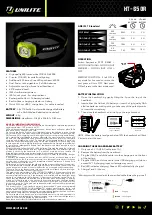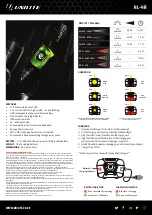
#26
Main
POWER
switch
#27 FUSE
(see page 13)
#28 POWER
connection
#29 DVI
output
(see page 15)
#30 USB
port
(see page 10)
#31 SERIAL
port for external remote controlling
#32 PREVIEW
RGBHV
output for control monitor
CONNECTIONS
The RGBHV-, Preview- and DVI-outputs
(#32, 33, 35 and 29)
can output a signal in the following formats:
- SXGA (1280x1024 pixel) at 60Hz
- XGA (1024x768 pixel) at 75Hz
- XGA (1024x768 pixel) at 60Hz (default setting if auto resolution does not work)
- SVGA (800x600 pixel) at 75Hz
- SVGA (800x600 pixel) at 60Hz
The “
Auto resolution
” function is activated by default. In this mode the Visualizer constantly checks which devices
are connected to the RGBHV
(#32, 33)
and DVI output
(#29)
and automatically sets the optimal output mode that
fits best for all connected units. Please note that the Visualizer can not check the possible resolution, if the
connected units or the cables* are not "Plug and Play" compatible. If the Visualizer can not detect the resolution of
ALL connected units, the output-mode is set to the default of XGA (1024x768) at 60Hz.
(* Cables with plug and play compatibility must have a 15-pin plug on both ends with all pins connected, pin 9 is not used)
In order to achieve the best picture quality you should set the outputs of the Visualizer to match the native resolution
of your display unit (e.g. LCD or DLP projector or monitor) -
see page 15
.
Important: What matters is the native resolution of the projector or monitor, not the maximum resolution that it can
display (in compressed mode). The native resolution is the actual number of pixels of the built in LCD display or
DLP chip of a projector or monitor. Most LCD or DLP projectors can also display higher resolutions than their native
resolution, but only in compressed mode and with inferior picture quality.
Do NOT set the output of the Visualizer to a higher standard than the native resolution of your display unit!
For LCD- or DLP-projectors, LCD-monitors and video-conferencing units a setting with 60Hz is recommended. For
CRT-based monitors or projectors use a setting with 75Hz, because these units may show a slight image flickering
with 60Hz.
Please note that images from the EXTERNAL INPUT
(#34)
are not output at the DVI output (#29)!
.
OUTPUT MODE (SXGA, XGA or SVGA)
and VERTICAL FREQUENCY (75 or 60Hz)
IMPORTANT
PAL / NTSC VIDEO OUTPUTS
The Y/C (S-video)
(#36)
and Composite
(#37)
video outputs can be switched between PAL and NTSC in the
units
(see page 15)
.
he picture quality of both video outputs is BY FAR NOT AS GOOD as
the picture quality of the data outputs
on-screen menu
Please note, that the picture quality of the Y/C (S-video)
(#36)
output is BETTER than the quality of the
Composite
(#37)
video output. However t
(#33, 32, 35 and 29).
This is because of the limitations of the PAL/NTSC
video system and because of the fact that this is just a converted Progressive Scan signal and not an original
video signal.
Please note that images from the EXTERNAL INPUT
(#34)
are not output at the Y/C (S-video) and Composite
output!
The Y/C (S-video) and Composite Video outputs are intended for control monitors, they output a signal even if
the picture is switched off.
#33 RGBHV
output 15-pin (switchable)
#34 EXTERNAL Input
for Computers (
see page 11)
#35 RGBHV
output BNC connectors (switchable)
(Sync-settings
see page 11
)
#36 PAL/NTSC Y/C
(S-Video) output
(see below)
#37
PAL/NTSC Composite video
output
(see below)
#38
Input for additional INFRARED SENSOR
(see page 12)
5
SXGA
33
PREVIEW
EXTERN IN
32
34
R
S/HD
G
B
VD
35
SERIAL
DVI
USB
31
Y/C
Video
29
30
36
37
IR SENSOR
38
27
28
26
F
U
S
E
T
3
,1
5
A



























